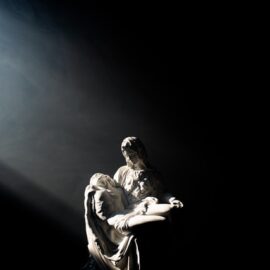

This article is an excerpt from the Shortform summary of "The Case for Christ" by Lee Strobel. Shortform has the world's best summaries of books you should be reading.
Like this article? Sign up for a free trial here .
Who is Joseph of Arimathea in the Bible? Can the texts about Joseph of Arimathea help prove that Jesus existed?
Joseph of Arimathea was a key figure in the Bible, and was a member of the council that voted to execute Jesus. He also was the one who arranged for Jesus to have an honorable burial.
Read more to find out about Saint Joseph of Arimathea, and why both Christian supporters and skeptics alike rely on his role in the Bible as evidence.
Jospeh of Arimathea and The Burial of Jesus
It goes without saying that, in order for Jesus’s tomb to be empty, he would have had to be buried in a tomb in the first place.
As it turns out, this fact can’t be taken for granted. Historians have shown that the bodies of crucified criminals were generally left on the cross to be eaten by birds or thrown in mass graves.
But those skeptics that appeal to the general case ignore the specific circumstances of Jesus’s burial.
First of all, there’s ample textual evidence that Jesus was in fact buried. For example, Corinthians 15:3—which, we know from Craig Blomberg, was authored very shortly after Jesus’s death—says explicitly that Jesus was buried.
Second, the gospels corroborate the summary account one finds in Corinthians. In all four gospels, the authors mention that Jesus’s body was turned over to Joseph of Arimathea and buried. It’s especially important that these facts appear in Mark, which was the earliest of the gospels to be written and thus less vulnerable to later embellishment. And, according to the textual history of Mark, the story of Jesus’s final week—termed the “passion story”—was taken from an even earlier source.
The Case of Joseph of Arimathea
Those skeptical of Jesus’s burial often highlight the implausibility that Saint Joseph of Arimathea would have arranged for the honorable interment of Jesus’s body. This is because Joseph of Arimathea in the Bible was a member of the Sanhedrin, the council of Jewish leaders that voted unanimously to execute Jesus.
The gospel of Luke accounts for this twist with the addition of a key detail: Saint Joseph of Arimathea wasn’t present at the vote to kill Jesus. Thus he may have been less indisposed toward Jesus than the rest of the Sanhedrin.
But there are other reasons to believe that this unlikely figure did indeed give Jesus an honorable burial. First of all, given early Christians’ anger toward the Jews for their role in Jesus’s death, it’s unlikely that an author of the time period would give credit to a member of the Sanhedrin if it wasn’t due. A second reason is that, for all the accounts of Jesus in both historical and Christian documents, there’s no alternate story of Jesus’s burial.
The Tomb
Interestingly, the biblical creed of the Resurrection (Corinthians 15:3–10) never mentions an empty tomb—it only reports that Jesus was resurrected and appeared to a number of witnesses. How can we be sure Jesus appeared physically rather than spiritually?
The Jewish understanding of resurrection—which is the same understanding present in the Bible—necessarily entails physical resurrection. (In fact, in the Jewish tradition, it’s the bones that are raised, while the flesh rots away.) So, when the Bible reports that Jesus appeared before the various witnesses to the Resurrection, it is implying an empty tomb.
It is also impossible that Jesus’s body was tampered with while he was entombed. First, based on archeological discoveries of tombs from that era, the entrance would have been blocked by a heavy stone disk that would have required several men to move. Second, the tomb likely would have been guarded. Remember, Joseph of Arimathea in the Bible was the one who arranged for this burial and entombment.
Arguments Over the Guard
One way skeptics call the Resurrection into question is by arguing that Jesus’s tomb wasn’t in fact guarded (and thus the disciples could have stolen his body).
Although contemporary scholars have ruled out the possibility that the disciples removed Jesus’s body—their later martyrdom simply wouldn’t make sense if they’d been the perpetrators of a hoax—there is historical evidence that Jesus’s tomb was indeed guarded.
When first-century Jews and Christians argued over whether the disciples had removed Jesus’s body, the Jews said, “The guards at the tomb fell asleep [which was why the disciples were able to remove Jesus’s body].” In this way, these first-century Jews, who were near contemporaries of Jesus, implicitly acknowledged that there were guards at Jesus’s tomb.

———End of Preview———
Like what you just read? Read the rest of the world's best summary of Lee Strobel's "The Case for Christ" at Shortform .
Here's what you'll find in our full The Case for Christ summary :
- How an atheist lawyer-journalist researched Christ and began believing
- The key arguments against the existence of Christ, and why they don't hold up
- How to make up your own mind about whether Christ existed







>In all four gospels, the authors mention that Jesus’s body was turned over to Joseph of Arimathea and buried.
Since , at least Matt and Luke were using Mark, why wouldn’t they mention this. IF Jesus was thrown in a roman pit, would the evangelists
be willing to report this?
> less vulnerable to later embellishment
Being less likely than later gospels to contain embellishment has no bearing on whether Mark, himself, **embellished**. Mark’s own account of Jesus trial tells us false things circulate about people in their own lifetime nevermind 35 to 50 years later
> Saint Joseph of Arimathea wasn’t present at the vote to kill Jesus.
Yet Luke (between 50 and 100 years later) , by your own standard, is more likely to certain embellishment
But luke doesn’t appear to say Jospeh wasn’t present at the vote. What he says is “he had not agreed when the other leaders decided to kill Jesus”
> given early Christians’ anger
What *early christians*? Christians 30 or more years later?
This is entirely non sensical. 1 Mark has the apostles flee when Jesus is arrested. They, nor his family, are said to have been around when Jesus is buried 2.) crediting a member of the sanhedrin with giving Jesus an honorable burial is a great way to show contempt: Even one of their own thought they were wrong! Of course, if Joseph were invented, he may have a unique purpose. Who else could bury Jesus in such a tomb except a wealthy patron.
> implying an empty tomb.
It does no such thing. You’re conflating tomb and grave. The tomb in Mark and later accounts is specifically a rock hewn tomb. However, since a belief in physical resurrection *implies* an empty grave, there’s no reason why this couldn’t be the source of the creedal statemnt. Besides, even if you’re right, thre’s no reason to think the tomb in Mark was empty.
> impossible that Jesus’s body was tampered with
Not at all grave robbing was a real thing. Given that Matthew, afaik, is the only one to mention the tomb was guaded, there’s little reason to think it isn’t an *embellishment*
The idea that either the Temple authorities or the Romans would be concerned over fake resurrection claims is preposterous. Paul himself tells us this is wrong.